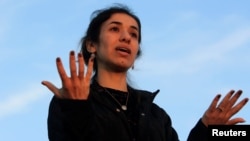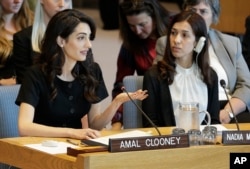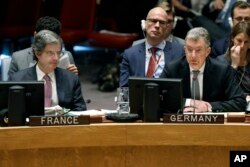Nobel laureate and former Islamic State captive Nadia Murad reproached the international community Tuesday, saying in the five years since thousands of ethnic Yazidi women were enslaved by the terror group in Iraq, not a single perpetrator has been brought to justice.
"Thousands of ISIL elements are free. Thousands are detained without trial," Murad said, referring to the group by an acronym. "We come here today and ask that those perpetrators of genocide be brought to justice."
Murad made the appeal at a meeting of the U.N. Security Council on the issue of sexual violence in conflict.
At its peak, the so-called Islamic State controlled large swaths of territory in Syria and Iraq. In 2014, its fighters seized the northern Iraqi town of Sinjar, where tens of thousands of Yazidis lived. The Yazidis are a mostly Kurdish-speaking people who practice a unique monotheistic faith and are a minority in the region.
Fighters killed scores of Yazidi men and enslaved several thousand women and girls, in atrocities the U.N. said amounted to genocide. The women were used as sex slaves, often sold or traded from one fighter to another. Many now have children by the men who raped them. Older women were made to do manual labor.
Last month, IS lost its last stronghold in Syria, and thousands of its fighters have been detained by local Kurdish authorities. The fate of many non-Iraqi and Syrian fighters is unclear as governments in Europe and elsewhere debate what to do about their citizens-turned-terrorists.
"They used Yazidi women as a weapon of war, hence, they need to be tried before a special court so that they will be tried for the crimes they committed," Murad told Security Council members. "Bringing elements of ISIL to justice in the framework of an international tribunal that tries them for crimes of genocide and sexual violence against women, would send messages to others and prevent such crimes in the future."
'We need steps, not just slogans'
Murad, who was kidnapped by the terror group and subjected to sexual violence for three months in 2014 , said there has been little international assistance for survivors.
"We come to the U.N., we deliver statements, but no practical steps are taken that include reconstruction or bringing the perpetrators to justice, or returning victims and displaced to their homes," she said. "We need serious steps on the ground and not just slogans."
Her lawyer, Amal Clooney, also addressed the council, warning that if the international community does not seek accountability now, it could soon be too late.
"Let us remember that the crimes committed by ISIS against women and girls are unlike anything we have witnessed in modern times," Clooney said, using another acronym for the group. "But the question of bringing them to justice has barely raised a whisper."
She said if the Security Council cannot prevent sexual violence, it must at least punish it.
"We are facing an epidemic of sexual violence, and I believe justice is the antidote," Clooney said.
In September 2017, the U.N. Security Council authorized the creation of a U.N. investigative team to collect and preserve evidence of IS crimes in Iraq for future trials. Clooney said the team's work got fully under way last month, and they have begun exhuming mass graves to identify the victims' remains.
On Tuesday, after much discussion and some deep disagreements, the Security Council adopted a resolution that focuses on supporting survivors of sexual violence in conflicts around the world.
"We have now a concentration on accountability. We have a survivor-centered approach. We are putting sanctions much more in the center of actions. We have the U.N. system watching it, reporting it," said German Ambassador Christoph Heusgen, whose delegation drafted the text.
'Real fight' for resolution
The resolution was adopted with 13 votes in favor and the abstentions of Russia and China. The U.S. had threatened to use its veto if language was not removed recognizing the importance of providing sexual reproductive health care assistance to survivors of sexual violence. After difficult negotiations, the Germans dropped the reference.
"It was for us not the ideal solution. As you could imagine, we would have liked to have strong language repeated and strengthened that language, but this was not possible," Heusgen told reporters. "So, the choice was, 'Do we give up everything for not reaching this?' Our choice was the one that civil society and the victims asked us to do."
France's envoy, Francois Delattre, told reporters ahead of the vote that negotiations were "a real fight." He expressed disappointment that there has been backsliding on women's rights by some countries.
"If we believe in the values of the U.N., if we believe in the values of women's rights, this is a real fight,"he said. "There are attitudes that we just don't understand."
"A survivor-centered approach means ensuring both their rights and addressing their needs," Inas Miloud, director of the Tamazight Women Movement in Libya, told council members. "As a priority, access to lifesaving interventions and post-rape medical care, including comprehensive sexual and reproductive health rights services, emergency contraception, the options of safe abortion services, and HIV prevention and treatment."














